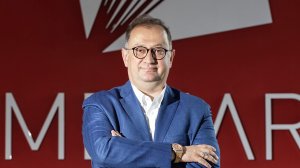JOHANNESBURG (miningweekly.com) – The private-sector’s Richards Bay Coal Terminal (RBCT) and the State’s Transnet Freight Rail (TFR) have shown that the private sector and State-owned entities can work together very well, Menar MD Vuslat Bayoglu has highlighted in a Zoom interview with Mining Weekly. (Also watch attached Creamer Media video.)
Menar is a private investment company with a portfolio of diversified minerals that includes anthracite, coal and manganese in South Africa, gold in Kyrgyz Republic and nickel in Türkiye,
In alignment with the company's ferrous strategy, Menar last month signed a memorandum of understanding with the government of Gabon to explore for iron-ore and manganese in Gabon.
Also being heightened, in Bayoglu’s view, is the prospect of more exploration investment taking place in South Africa following the appointment by South Africa’s Department of Mineral Resources and Energy (DMRE) of a new service provider for its cadastral system.
“If you are a serious investor, and you are waiting for your mining right, the DMRE is very helpful. They are always on the side of the investor to unlock value because they know that they have a duty to support the economy so that jobs are created, and procurement opportunities are given to community businesses.
“More consistent and reliable DMRE licensing processes will attract investors to the country. South Africa has great potential for exploration. This will help existing companies in South Africa, and companies coming from other parts of the world, to feel more comfortable when applying for prospecting or mining rights,” Bayoglu noted.
COAL LINE SECURITY
Pointing out that the partnership between RBCT and TFR began with security services, Bayoglu credited RBCT with having played an important role in helping TFR to minimise security incidents, especially cable theft, which is critical because when cables are stolen, the system comes to a halt.
RBCT’s work with TFR to supply batteries and compressors for locomotives is helping with improving locomotive availability, which Bayoglu identifies as TFR's biggest problem.
“If locomotives need spare parts, and the spare parts are not there, the locomotives remain idled. This issue will be resolved by providing spare parts to TFR. It will assist with locomotives' availability and improve capacity on the coal line,” Bayoglu commented.
Collaboration has resulted in TFR moving about one-million tons of coal a week, compared with only 700 000 t to 800 000 t a week earlier.
“Another good example of a collaboration between the private sector and TFR is the partnership with Kalagadi Manganese, which opened the rapid loader facility for junior manganese miners.
“We will hopefully start to move the first manganese to Port Elizabeth soon. It is a good initiative and we appreciate what Kalagadi is doing by helping junior manganese miners and unlocking capacity,” Bayoglu acclaimed.
Mining Weekly: What is the latest on the advancement of the Gugulethu Colliery project in Mpumalanga and what is the latest on upcoming projects such as Bekezela in Gauteng and Thuso also in Mpumalanga?
Bayoglu: We have been developing Gugulethu for the past two years, and things are going according to plan. We opened the pit, have seven teams working, and have an operational processing plant. We also did the cold commissioning and hot commissioning of the plant. We are targeting steady-state production within the next three months.
The target is to mine 200 000 t monthly and process it to between 110 000 t and 120 000 t of saleable product a month. We employ people from the community; we have already employed 41 young people and trained them as machine operators. When we reach steady state production, we will employ 410 people in total. We are hoping that the first coal that will be exported will be ready in the next two to three weeks.
Bekezela and Thuso are now fully licensed. We are hoping to start developing both projects this year. Again, these are exciting times for us as Bekezela will hopefully be a mega-mine. We are planning to produce about 600 000 t run-of-mine a month and wash the coal for potential customers. We are planning to mine 100 000 t a month at Thuso, which is an underground mining project. The interesting part is that we carry on developing coal mines in an environment where people talk less about coal. We feel that the environment is suitable for developing new mines because it creates much-needed jobs for the country. Things are looking good for the future, and we will carry on investing in the coal mining industry.
EMAIL THIS ARTICLE SAVE THIS ARTICLE ARTICLE ENQUIRY
To subscribe email subscriptions@creamermedia.co.za or click here
To advertise email advertising@creamermedia.co.za or click here










